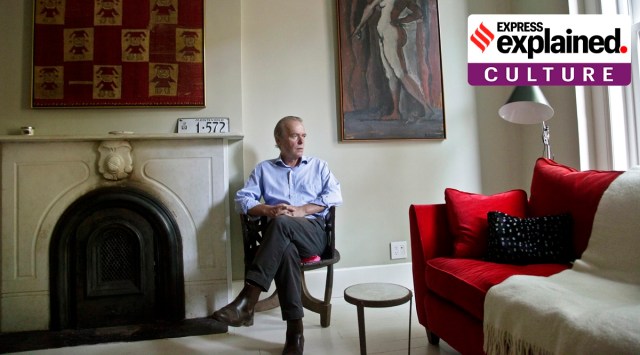Early inspiration, great style and rhythm: What made Martin Amis the writer he was
Martin Amis, the author of 15 novels, a memoir, and several volumes of non-fiction writing and short stories, was one of Britain's most influential writers.
 British novelist Martin Amis poses in the living room of his new home in the Brooklyn borough of New York on Aug. 17, 2012. Amis, who brought a rock ‘n’ roll sensibility to his stories and lifestyle, has died. (AP Photo/Bebeto Matthews, File)
British novelist Martin Amis poses in the living room of his new home in the Brooklyn borough of New York on Aug. 17, 2012. Amis, who brought a rock ‘n’ roll sensibility to his stories and lifestyle, has died. (AP Photo/Bebeto Matthews, File) Amid the outpour of tributes for British writer Martin Amis, who passed away on May 19, one by writer and actor Steve Martin stood out.
“When I was a younger writer, I was at a small dinner with Martin Amis. A writer’s name came up and Martin said, casually, ‘Well, he’s a sloppy writer.’ I said, ‘What makes a sloppy writer?’,” Martin wrote on Twitter.
“He said, ‘Unintended alliteration, accidental rhyme, repetition of words.’… A few years later I had dinner with him again and reminded him of this conversation. He said, ‘We’re rethinking repetition of words,’” Martin wrote.
It was this voice — dark, caustic and unfailingly funny — that made Amis, the author of 15 novels, a memoir, and several volumes of non-fiction writing and short stories, one of Britain’s most influential writers. Amis died of oesophageal cancer at his residence in Lake Worth, Florida. He was 73.
Literary royalty
In a way, Amis was literary royalty. Son of the feted writer Kingsley Amis and Hilary Ann Bardwell, Amis was born on August 25, 1949, in Oxford. Following the success of the senior Amis’s ‘Lucky Jim’ (1954), his father’s peripatetic academic life saw Amis and his siblings — an older brother and a younger sister — attend schools across the United Kingdom, Spain, and for a year, in the United States. It was this life and the need to foster new friendships wherever he went that led him to develop a sense of humour, Amis said in an interview.
If his father’s influence wasn’t enough, Amis’s interest in the writing life was piqued by his stepmother, the novelist Elizabeth Jane Howard, who encouraged him to read widely. He graduated from Exeter College, Oxford, with first class honours, and worked with the Times Literary Supplement (TLS) and the New Statesman.
His first novel, the autobiographical ‘The Rachel Papers’, was published in 1973, when he was working as an editorial assistant at TLS. The novel won the Somerset Maugham Award in 1974.
His writing life
His second novel was ‘Dead Babies’ (1975), followed by ‘Success’ (1978). Amis is most well-known for his London trilogy— ‘Money: A Suicide Note’ (1984), a satire set in Thatcherite England, ‘London Fields’ (1989), and ‘The Information’ (1995), a novel centred on the rivalry between two writers.
Though he did not win the Booker Prize, Amis’s ‘Time’s Arrow’ was shortlisted for the Booker Prize in 1991, and his ‘Yellow Dog’ was longlisted in 2003. His memoir ‘Experience’ (2000) won the James Tait Black Memorial Prize.
His non-fiction work includes anthologies of essays such as ‘The Moronic Inferno and Other Visits to America’ (1986), ‘Visiting Mrs Nabokov and Other Excursions’ (1993), and ‘The War Against Cliche’ (2001). He also wrote ‘Koba the Dread’ (2002), an investigation of Stalin’s brand of communism and its fallouts.
‘Inside Story’ (2020) was his last published novel. Behind its fictional veneer, Amis explored his relationship with his long-time friend, the writer Christopher Hitchens, and his father.
Master stylist
His father apart, Amis was influenced deeply by the writings of Vladimir Nabokov and the American writer Saul Bellow. In an interview with the Paris Review in 1998, Amis said, “I think that novels are about the author’s voice, and this perhaps is why I haven’t got much time for the novel that dutifully apes the voice of the bricklayer or even the etymologist or whatever it might be. What gives the voice its own timbre and its own resonance is what interests me, and that is always there, right from the start. It has to do with what is inimitable about the writer.”
His relationship with language and the unique route it charted led to Amis being counted as one of the most innovative of contemporary British writers in the late Eighties-early Nineties, alongside Salman Rushdie, Ian McEwan and Julian Barnes.
Style, Amis maintained, was crucial to a writer’s art. In the same Paris Review interview, he said, “It’s not the flashy twist, the abrupt climax, or the seamless sequence of events that characterises a writer and makes him unique. It’s a tone, it’s a way of looking at things. It’s a rhythm, it’s what in poetry is called a sprung rhythm.”
Befittingly, in his tribute to his friend in The New Yorker, Rushdie wrote, “Only Martin sounded like Martin Amis, and it was unwise to try to imitate him.”
A few controversies
During the course of his long career, Amis found himself at the centre of several controversies. One of the earliest among them was the very public plagiarism row with Jacob Epstein, the son of The New York Review of Books (NYRB) founding member, Barbara Epstein.
Amis accused Jacob of plagiarising entire passages from his ‘The Rachel Papers’ in his own debut novel, ‘Wild Oats’ (1980). While Jacob later admitted to the charge, Amis’s books were barred from review in the NYRB for almost three decades.
At the height of his success in the mid-nineties, Amis changed his long-time agent, Pat Kavanagh, wife of writer Julian Barnes, for Andrew Wylie when the former turned down his demand for a whopping $794,500 advance. It ended his friendship with the couple. Amis later admitted that it had been a mistake and reconciled with them.
After 9/11, Amis was accused of Islamophobia, following comments in several interviews in which he claimed that Muslims ought to “suffer until they get their house in order” and that he feels “an intellectual distance to Islam”.
His views were called out by many, including the Marxist critic Terry Eagleton. Afterwards, the writer said he’d spoken in the context of religious extremism and not about the community in general.



- 01
- 02
- 03
- 04
- 05



































